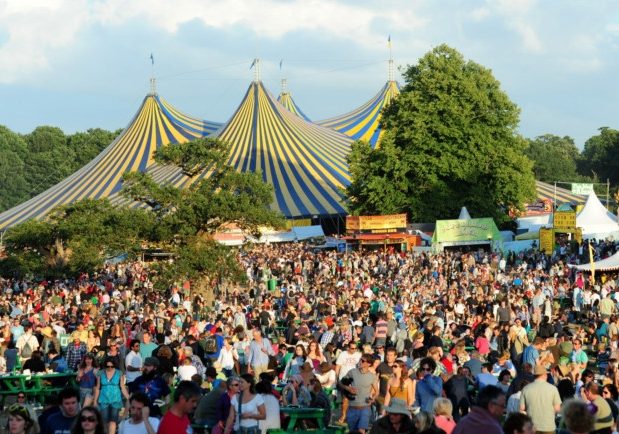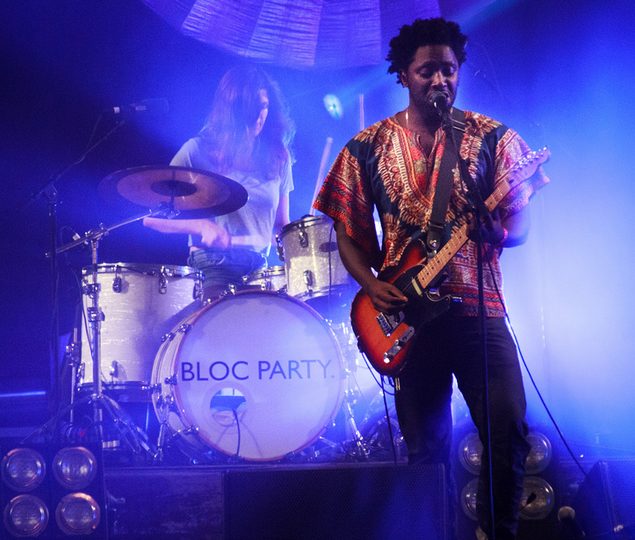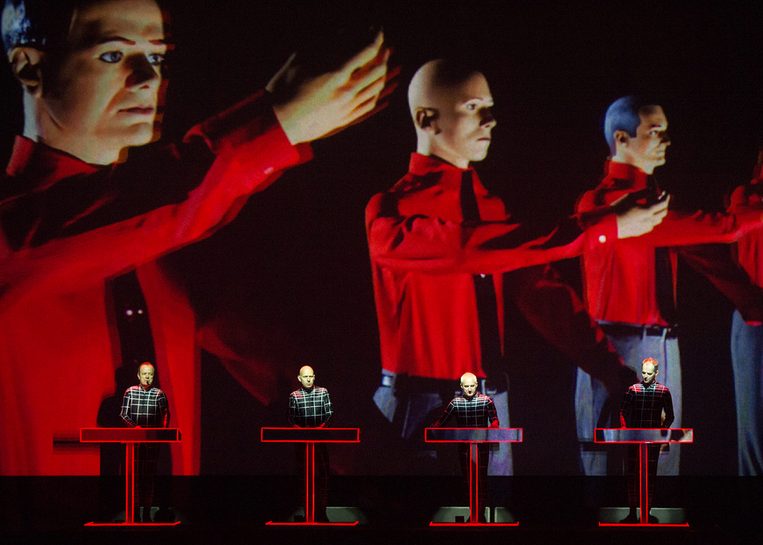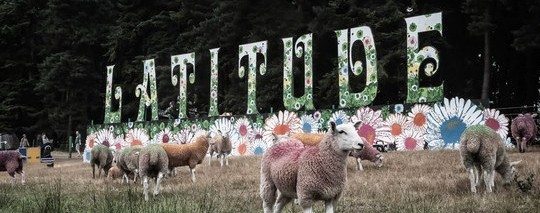Festival Review: Latitude
In its eight short years of existence, Latitude has undoubtedly made a name for itself as one of the most original (and successful) new festivals in Britain. In recent years, it has boasted headliners as impressive as Bon Iver, Arcade Fire, Pet Shop Boys and Belle & Sebastian. However, in spite of accommodating such huge talents, Latitude has simultaneously maintained its modesty by showcasing smaller – yet undeniably talented – acts of all genres, which in the past have included Alt-J, Villagers and M83. Such variety has led to its assured establishment alongside heavyweight festivals such as Reading / Leeds and T in the Park.
2013’s outing preserved such success, with Latitude’s organizers managing to land electronic German giants Kraftwerk, in what many anticipated to be the highlight of the weekend, with accompanying headliners Bloc Party and Foals carrying slightly less pressure to dazzle the masses. Despite this attractive pull for many, it was the supporting acts of Grizzly Bear, Disclosure, Rudimental, Hot Chip, and the Yeah Yeah Yeahs, among others, which provided the backbone of one of this summer’s strongest line-ups.
 Friday morning in Henham Park commenced in glorious fashion, with the entire festival site bathed in sunshine to the soothing soundtrack of Tim Burgess and Nick Mulvey. Both acts eased the crowds into the festival spirit, each playing surprisingly confident and entertaining mid-afternoon sets. Nevertheless, it was the Oxford-based Stornoway who dominated Friday afternoon; the group performing such unashamedly joyful anthems that the crowd could do little but feel totally charmed.
Friday morning in Henham Park commenced in glorious fashion, with the entire festival site bathed in sunshine to the soothing soundtrack of Tim Burgess and Nick Mulvey. Both acts eased the crowds into the festival spirit, each playing surprisingly confident and entertaining mid-afternoon sets. Nevertheless, it was the Oxford-based Stornoway who dominated Friday afternoon; the group performing such unashamedly joyful anthems that the crowd could do little but feel totally charmed.
Despite the music of the Friday afternoon being decidedly remarkable, it was the comedy tent which held several highlights, not only of the first day, but of the entire weekend. The unenviable task of compère fell to Lee Nelson, who handled the gig with undeniable charisma, charm and hilarity: three assets which are slightly lost on television, but are perfectly-suited to the stage and live audiences. Added to this was Marcus Brigstocke’s off-the-cuff routine to buy time for a delayed Mark Watson, delivered with a level of confidence and zeal to be expected at a touring gig in the capital, rather than an unforeseen comedy slot in the Suffolk countryside. Brigstocke was in the similarly stellar company of personalities such as Sean Locke, Eddie Izzard, and Dylan Moran, all of whom graced the stage with solid sets of their own. However, the unequivocal pinnacle of the comedy tent was Adam Buxton‘s BFI show BUG. It’s rare that one can ever describe anything as unique, let alone a comedy act, but in this case no other word is more applicable. Absurd, inventive and hilarious, BUG showcases the newest and most innovative music videos, scans the internet for all comments obscene and outlandish, and even includes irreverent clips of Brad Pitt, marking this out as a show that cannot be missed, if the opportunity ever knocks.
 All this excellence, and the actual music headliners of the weekend have yet to be mentioned. Bloc Party took to the stage following a set of somewhat-unexpected exuberance from The Maccabees (proving that someday soon, they will be worthy of a headline slot of their own), to a crowd that wasn’t expecting anything beyond noteworthy. Since their hiatus in 2009, the band have been treated with so much caution by fans and critics that it errs on suspicion. Kele Okereke and his band (minus Matthew Tong) proved the disbelievers wrong by trotting out classic after classic, only occasionally throwing in new material and, at one rather befuddling stage, a cover of Katy Perry’s ‘Firework’. Nevertheless, all curious choices were forgiven, thanks to an extended encore which included an emotionally charged rendition of ‘This Modern Love’, rounding off what many assume to be the band’s last ever performance. If this proves to be the case, then the band couldn’t have finished their incredible career in better style.
All this excellence, and the actual music headliners of the weekend have yet to be mentioned. Bloc Party took to the stage following a set of somewhat-unexpected exuberance from The Maccabees (proving that someday soon, they will be worthy of a headline slot of their own), to a crowd that wasn’t expecting anything beyond noteworthy. Since their hiatus in 2009, the band have been treated with so much caution by fans and critics that it errs on suspicion. Kele Okereke and his band (minus Matthew Tong) proved the disbelievers wrong by trotting out classic after classic, only occasionally throwing in new material and, at one rather befuddling stage, a cover of Katy Perry’s ‘Firework’. Nevertheless, all curious choices were forgiven, thanks to an extended encore which included an emotionally charged rendition of ‘This Modern Love’, rounding off what many assume to be the band’s last ever performance. If this proves to be the case, then the band couldn’t have finished their incredible career in better style.
Even lesser-known alternative acts performed with tenacity and resolve, and consequently, the majority of shows – regardless of their positioning in the festival’s line-up – felt both extraordinary and memorable.
Bloc Party were just the beginning of the headlining story, as the fascinating combination of Kraftwerk and Foals was yet to be experienced. The German quartet were the talking point of the weekend, and with good reason. Present since 1970 (though with an entirely new line-up, bar one member), Kraftwerk have influenced pop culture and the formation of technological music for decades; a fact more than evident in the legions of fans who convened for their 3D performance. With specialty glasses at the ready, a mixed crowd of hardcore fans and curious onlookers settled down for what promised to be an evening nobody would forget. Disappointingly though, all the anticipation and hype surrounding Saturday evening couldn’t hold up for the hour-and-a-half set, and as the crowd thinned gradually over the course of the evening, even the band didn’t seem to be too bothered by the involvement (or lack thereof) of those in attendance, with only a “Danke. Auf wiedersehen” serving as the sole acknowledgment of the 10,000-strong crowd. It was undoubtedly the biggest let down of the weekend, though still managed to produce images that can never be erased, including 3D computers floating in a field.
 It appeared as though Foals were going down a similar road to Kraftwerk, as they aimed to dazzle by indulging in pyrotechnics and lasers, but although these effects threatened to deter from (rather than enhance) the band’s performance, their music remained the outstanding aspect of the show. Delivering a healthy portion from each of their three albums, Foals proved why they have been so deserving of a headline slot after many years of hard graft. Though frontman Yannis Philippakis proved to be obnoxious on several occasions, all could be forgiven for the sounds of ‘Blue Blood’, ‘Bad Habit’ and ‘Spanish Sahara’ ringing out over the rolling hills of Henham Park, creating a stunning close to the festival.
It appeared as though Foals were going down a similar road to Kraftwerk, as they aimed to dazzle by indulging in pyrotechnics and lasers, but although these effects threatened to deter from (rather than enhance) the band’s performance, their music remained the outstanding aspect of the show. Delivering a healthy portion from each of their three albums, Foals proved why they have been so deserving of a headline slot after many years of hard graft. Though frontman Yannis Philippakis proved to be obnoxious on several occasions, all could be forgiven for the sounds of ‘Blue Blood’, ‘Bad Habit’ and ‘Spanish Sahara’ ringing out over the rolling hills of Henham Park, creating a stunning close to the festival.
Of course, the talent of the weekend did not simply belong to the top of the bill. Grizzly Bear, Hot Chip, Yeah Yeah Yeahs and Tallest Man On Earth all brought exemplary offerings to the table which arguably equaled (and in the case of Kraftwerk, surpassed) the big guns. Even lesser known alternative acts, such as the hilarious Johnny & The Baptists (presented by Robin Ince) and the hugely talented – and underrated – Efterklang performed with tenacity and resolve. Consequently, the majority of shows, regardless of their positioning in the festival’s line-up, felt both extraordinary and memorable.
Latitude Festival is a rarity, insofar that it has so much to offer (and at such unbelievable levels of quality) considering both the size and age of the event. How often can one genuinely have to decide between seeing Eddie Izzard, Yeah Yeah Yeahs and Germaine Greer, all in the same place at the same time? The truthful answer is hardly ever, and illustrates to the world why Latitude is – as it promises – so much more than just another music festival.

Comments (1)